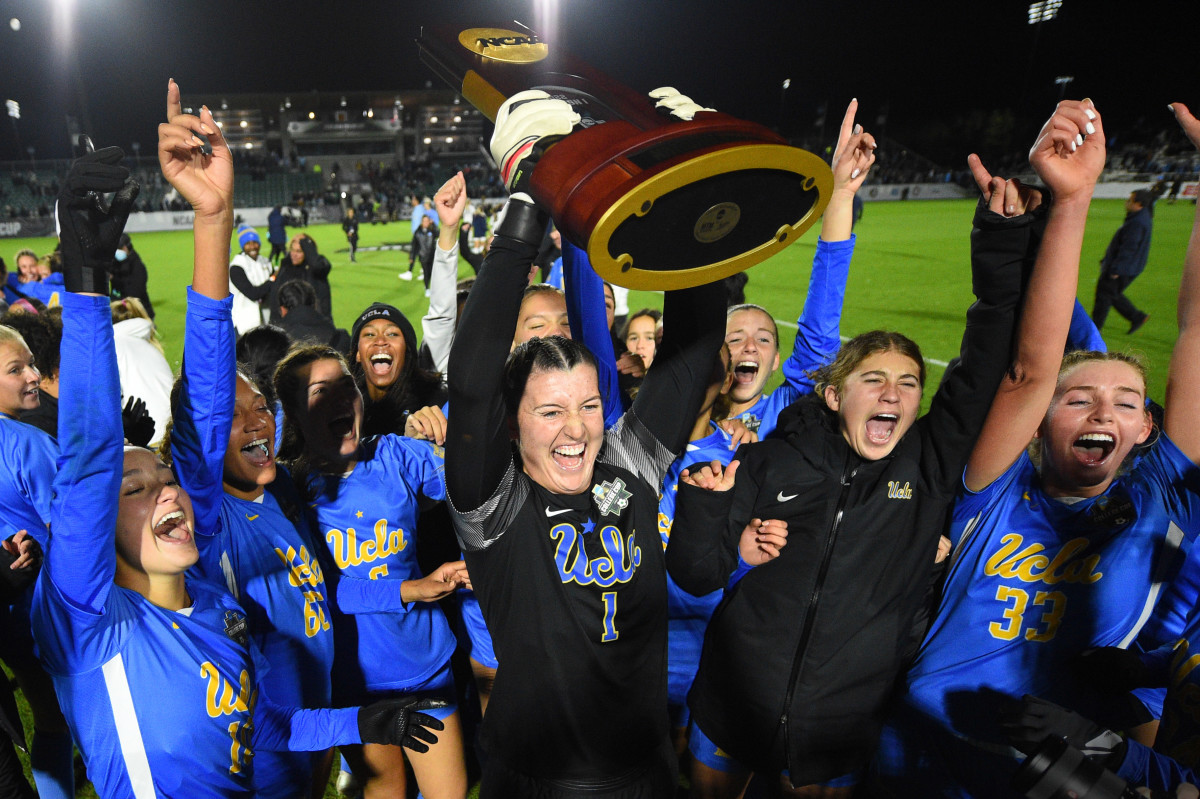Money Doesn’t Change Everything: ACC, Pac-12 Find Still Find Success in the Form of Titles

Two of the hotter story lines of the spring in college athletics centered on the perceived turmoil within the Atlantic Coast Conference and Pac-12. Unhappy members, uncertain futures—if only they could be as stable as the Southeastern Conference and Big Ten, right?
Yet while the Trouble in the ACC/Trouble in the Pac-12 rumblings got a lot of attention—and deserved it—here’s what else has been happening: Schools that are members of those leagues have actually been busy winning stuff. Lots of stuff. More national titles than their richer rivals in the SEC and Big Ten, more than their buzzier cousins in the Big 12, more than any other conference.
In the 2022–23 academic season that concluded Monday night with the men’s baseball final, ACC member schools have won nine national championships:
- Two for North Carolina (field hockey, women’s tennis)
- Two for Virginia (women’s swimming, men’s tennis)
- Two for Notre Dame (fencing, men’s lacrosse)
- One for NC State (women’s cross country)
- One for Syracuse (men’s soccer)
- One for Wake Forest (women’s golf)
Pac-12 member schools have also won nine titles (although not all of them have been in sports the conference sponsors):
- Three for Stanford (men’s gymnastics, rowing, women’s water polo)
- Two for California (men’s water polo, men’s swimming)
- Two for UCLA (women’s soccer, men’s volleyball)
- One for USC (beach volleyball)
- One for Utah (skiing)
Stanford also locked up the all-sports championship, locking up its long-held title back from Texas after the Longhorns appropriated it for the previous two years.
The rest of the power conferences?
- Eight for the SEC (football, women’s basketball, bowling, men’s and women’s indoor track, men’s golf, men’s outdoor track, baseball)
- Four for the Big 12 (women’s volleyball, women’s gymnastics, softball, women’s outdoor track)
- Three for the Big Ten (women’s ice hockey, wrestling, women’s lacrosse)
When the empire-building of the SEC and Big Ten ramps up a notch on July 1, 2024, the balance of all-sports power is likely to shift toward those leagues. Future SEC members Texas and Oklahoma each won two national titles this academic year (volleyball and women’s outdoor track for the Longhorns, softball and women’s gymnastics for the Sooners). Future Big Ten members USC and UCLA combined for three titles.

But in the meantime, maybe we should shine a light on the broad-based excellence of the ACC and Pac-12 as they currently stand. Maybe, instead of fixating on finances and revenue and squabbling schools with wandering eyes, we should take a moment to consider the ones that are blooming where they are planted, winning at the highest level with their available funds and facilities.
“The question is, how many resources do you need to be successful?” asks ACC commissioner Jim Phillips. “Are we chasing a dollar amount, or are we chasing success? Maximizing revenue, that’s the reality of modern-day college sports. You can’t be tone-deaf to that, and we aren’t. We are addressing that every day. But we want to continue to be a conference that chases success—academically and in all 28 sports, by all 15 schools.
“I believe you can have it all in the ACC. I believe we’ve proved that. That’s reflective of the commitment the schools have made, long before I showed up, to invest in broad-based athletic opportunities for men and women.”
And the ACC came very close to winning several more championships. North Carolina lost in heartbreaking fashion in the women’s soccer title game; three of the final four teams in the women’s lacrosse tourney were from the league; two of the final four in men’s golf; two of the final four in women’s volleyball; and Wake Forest made the final four in baseball.
We tend to fixate on football as the only thing that matters, with men’s basketball a distant second and women’s basketball and baseball on a third tier. Living in a football-centric universe is understandable, given the ticket sales, broadcast ratings and revenue those sports command. That’s where the greatest interest lies.
But in this bizarre era in which fans have been duped by administrators into rooting for profits as much as actually winning on the field, that tunnel vision is limiting. Ignoring the accomplishments of other, less-profitable sports on campus is insulting to the majority of scholarship athletes who constitute Division I athletic departments. It also puts all eggs in one or two baskets, narrowing the bandwidth of what is perceived as success. Would the average fan rather celebrate an Olympic sports national title or making more money in a TV deal?
And beyond winning college championships in Olympic sports, what about winning in those sports at the actual Olympics? College remains the predominant feeder program and talent developer for the U.S. Olympic movement, which makes the ACC and Pac-12 extremely valuable to the nation on the international competition stage.
Of the 23 athletes named to the U.S. national team for the upcoming Women’s World Cup, 21 played soccer collegiately. Of that group, nine played in the Pac-12 and five in the ACC. In an era when Olympic sports are increasingly threatened by revenue reallocation, Americans should consider what could be lost in the transaction. The more schools pay their football strength coaches, recruiting assistants, offensive analysts and social media teams, the less there might be to recruit, train and develop the next Olympian.
“I hope we won’t forget about Olympic sports,” Phillips says. “That’s worth fighting for.”
For the moment, it’s worth pausing the infighting in the ACC and Pac-12 over money to appreciate what the conferences have accomplished in 2022–23. Enough talk about turmoil. More talk about trophies. Football will be here soon enough, and everyone can get back to fussing over media-rights revenue then.
